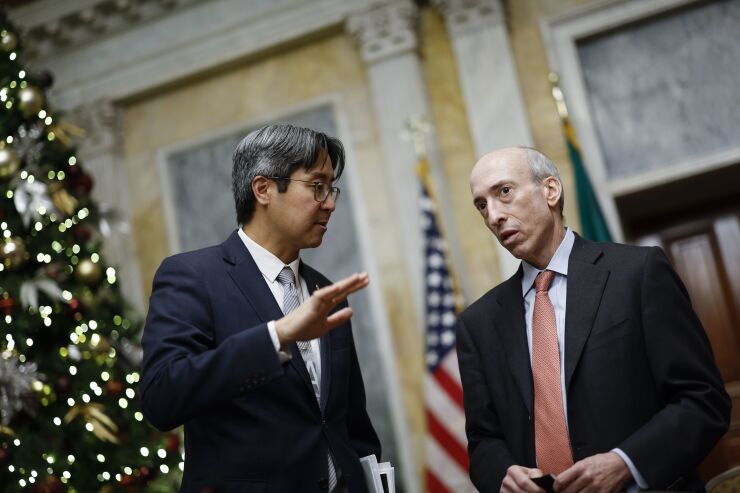
WASHINGTON — The rapid expansion of private credit — and banks' relationship with firms that offer it — has begun to draw significant attention from bank regulators, and could signal a new regulatory priority if President Biden wins a second term.
Private credit — also known as private debt — refers to instances where nonbanks lend directly to companies, bypassing more traditional and regulated paths like bank lending, capital markets or bond issues to obtain capital.
The alternative investment class has seen substantial growth since its inception in the 1980s, reaching an estimated total lending volume of nearly $2 trillion in 2024. The
The Financial Stability Oversight Council — a regulatory body created by the Dodd-Frank Act composed of the heads of nine federal financial regulators — pointed to the sector's lending to high-risk borrowers and its links to banks as potential sources of financial instability in a May 2023 report. The council stopped short of demanding regulatory action, suggesting instead that the group enhance its data collection on nonbank lending to nonfinancial businesses.
Industry experts say the likelihood of FSOC taking action is low in an election year, but that another Biden term could give the group time to pursue such risks.
"If Biden remains in office, I think you will see continued statements of concern from Democratic regulators," said Ian Katz of Capital Alpha Partners. "In a second term the FSOC would have four years to do something, so I think there's a good chance of some kind of measure by FSOC, perhaps a designation of some private credit-related activity as potentially systemic."
Regulatory agencies — many of which also have leaders who sit on FSOC — have raised concerns on their own. A February 2024
Acting Comptroller of the Currency Michael Hsu recently
"[Under this approach,] closed-end funds with long lockup periods would have a lower scalar than innovative, non-closed-end fund structures, such as evergreen funds," Hsu noted. "Private credit funds with no links or affiliations with PE-influenced insurers or reinsurers would have a lower scalar than those with links and affiliations."
Katz said regulatory interest adds pressure on both fellow regulators on FSOC to do something about the alternative investment class.
"The FSOC probably has the most direct tools. It could designate non-bank firms systemically important, subjecting them to Federal Reserve oversight. And the FSOC could designate an activity as systemic," Katz said. "Nonbank private credit firms don't have a natural overseer, so it's not easy."
He notes that the Securities and Exchange commission, which regulates many of the firms which provide private credit, can impose indirect oversight through increased disclosure. No single agency, however, can take more direct action like growth caps or restricting private credit firms from certain activities, rendering FSOC the most likely venue for such restrictions.
Lawmakers have ramped up calls to address the rise of private credit as well. Sens. Sherrod Brown, D-Ohio, and Jack Reed, D-R.I., urged the main three bank regulators to scrutinize private
"Linkages [between banks and private credit] may pose hidden dangers to the banking system, especially as most of the private credit market has not endured a full economic cycle with elevated default rates," the letter noted. "Given the sector's expectations of rapid growth, these risks are already increasing as private credit fund managers continue to collect cash and deploy it on riskier deals."
Amongst regulators however, there is a diversity of opinion about how urgent the risks posed by private credit are. Federal Reserve Chair Jerome Powell
Investment sector advocates like the Managed Fund Association's President and CEO Bryan Corbett argued private credit is already well regulated.
"Private credit does not have a government backstop and presents no taxpayer risk, unlike banks," he said. "Private credit managers have investors with long time horizons and are already well regulated by the SEC."
Banks, meanwhile, see the sector as a source of growth.
"I think a Trump administration would have a more hands-off approach to private credit and would be less interested than the Biden administration in trying to restrict it," Katz said.






